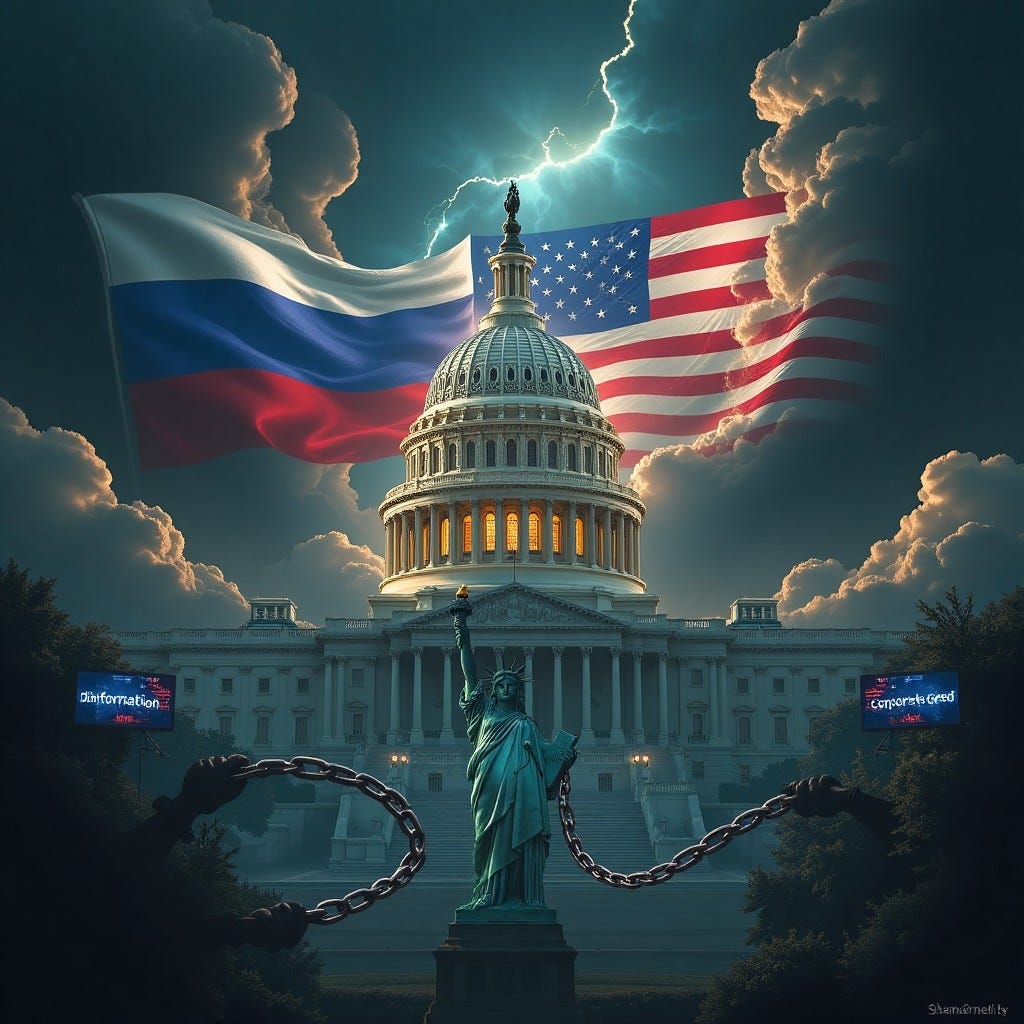Face It, America: You Are Under Siege
How a Nation Once Built on Strength is Now Compromised by Geopolitical Surrender
The Great Shift: From Cold War Rival to Quiet Ally
America once stood as the beacon of democracy, the unwavering opposition to Russian expansionism and authoritarian rule. The Cold War cemented the U.S. as the defender of Western values, NATO alliances, and global stability. Fast-forward to today, and America is under siege—both politically and ideologically—by forces it once sought to contain.
America, knowingly or unknowingly, is selling itself out to Russian influence—through policy inaction, economic dependence, and a cultural war that has fractured its global standing. Whether due to political manipulation, corporate greed, or ideological complacency, the United States is no longer the stronghold against Russian aggression that it once was.
1. Political Complicity: The Weakening of American Resolve
Since the fall of the Soviet Union, American leadership has increasingly underestimated Russia's long-term ambitions. Under multiple administrations, particularly in recent years, Russia has been able to maneuver geopolitically without significant pushback from the U.S.
Trump’s Admiration of Putin: President Donald Trump’s refusal to condemn Russian actions—from election interference to military aggression—has set a dangerous precedent for American foreign policy. By casting doubt on NATO, undermining allies, and hesitating to support Ukraine, Trump has emboldened Russian expansionist policies.
Isolationism as a Policy Strategy: The shift toward "America First" policies has effectively sidelined key allies in Europe, leaving NATO weaker and more vulnerable to Russian influence.
Bipartisan Weakness: While Trump’s actions are overt, even Democratic administrations have shown a lack of strong deterrence. The Obama administration’s weak response to Crimea’s annexation in 2014 signaled to Russia that its actions would go largely unpunished. Meanwhile, the Biden administration has struggled to maintain unwavering commitment to Ukraine in the face of internal political divides.
2. Economic Dependence and Strategic Leverage
While America flaunts economic supremacy, Russia has successfully wielded economic tools to chip away at U.S. influence.
Energy Dependence: Despite being one of the largest energy producers, the U.S. has not taken full advantage of its energy independence. Meanwhile, Russian gas supplies continue to dictate European politics, indirectly impacting American geopolitical influence.
Financial Corruption and Oligarchic Influence: Russian billionaires, with ties to the Kremlin, have laundered billions through Western financial institutions, buying political favor and destabilizing economic transparency.
Trade and Sanctions Loopholes: Despite numerous sanctions against Russia, American corporations and financial institutions have found ways to engage with Russian interests, undermining the very policies meant to contain Russian aggression.
3. Media Manipulation and the Propaganda War
The greatest battlefield today is not in Ukraine or the South China Sea—it is in the digital realm, where information warfare is at its peak. Russia has mastered the art of disinformation, and America has willingly allowed itself to become vulnerable.
Election Meddling: Russian-backed cyber warfare and social media manipulation have influenced multiple U.S. elections, yet America’s response has been tepid at best.
Polarization Through Disinformation: Russian state-sponsored propaganda has exacerbated America’s internal divisions, from racial tensions to debates on democracy itself.
Compromised Media: The rise of biased media, often fueled by Russian-backed narratives, has led to widespread misinformation, further weakening the country’s ability to unite against foreign threats.
4. Abandoning Ukraine: A Gift to Moscow
One of the clearest examples of America’s weakening stance against Russia is its wavering support for Ukraine. As the war drags on, political factions in the U.S. are questioning financial and military aid, giving Putin exactly what he wants—an uncertain, divided, and hesitant America.
The “America First” Mindset: The argument that Ukraine aid is a waste of American resources plays directly into Russian interests, weakening U.S. credibility among allies.
Negotiation With a Dictator: Trump’s recent rhetoric suggesting he could "end the war in 24 hours" dangerously implies that America is willing to appease Russian demands, rather than support the sovereignty of a democratic nation.
Undermining NATO Unity: Hesitation in aiding Ukraine weakens NATO’s unity, setting a precedent that will embolden Russia’s next territorial ambitions.
5. The Future of America Under Russian Influence
If current trends continue, the U.S. will not only lose its status as a superpower but will become a secondary player in global politics, manipulated by the very forces it once sought to contain.
A Fractured Global Order: Russia, alongside China, is working to shift the world from a U.S.-led global order to a multipolar system where authoritarian regimes dominate.
Weakening Democracy: The continued embrace of Russian-style governance, including the suppression of press freedom and the erosion of democratic institutions, is already evident in parts of the U.S. political landscape.
A Proxy State in All but Name: Without a strong stance against Russian interference, America risks becoming a nation where policy, elections, and public sentiment are all influenced by an external autocratic power.
Conclusion: America Is Under Siege—Will It Fight Back?
America is on a dangerous path, one where it is slowly selling itself out to Russian interests. Through political appeasement, economic entanglements, media manipulation, and weakened foreign policy, the U.S. is inching closer to a reality where it no longer dictates global stability but reacts to the whims of foreign adversaries.
The question remains: Will America wake up and fight for its future, or will it surrender to forces that seek to dismantle its democracy from within?


